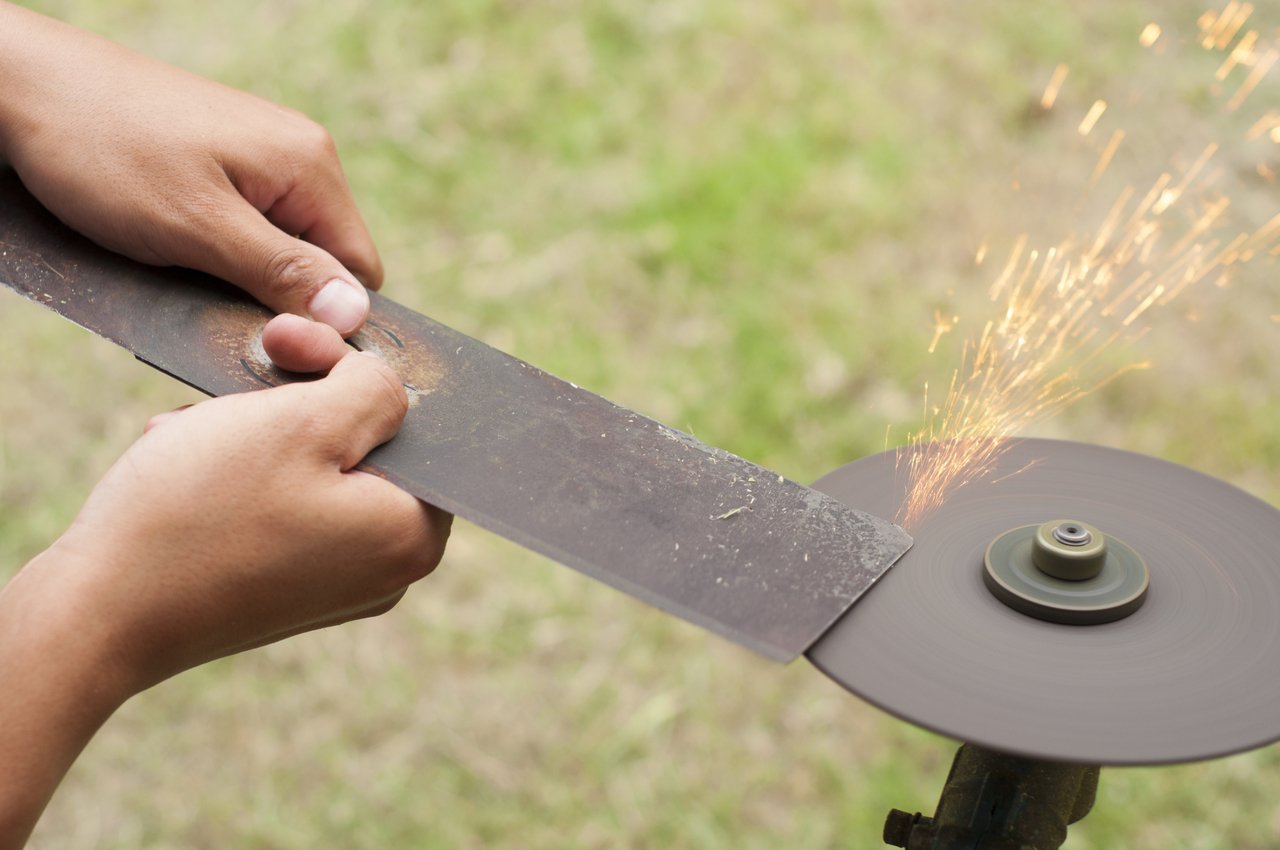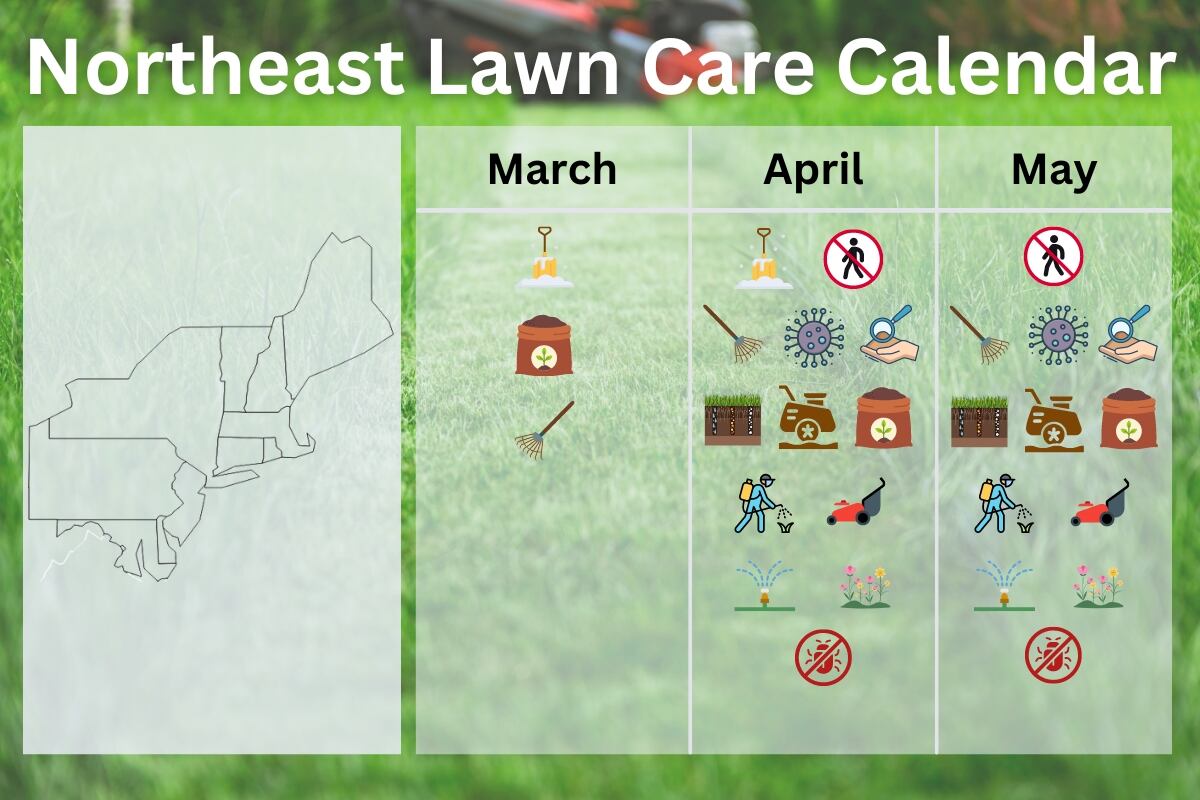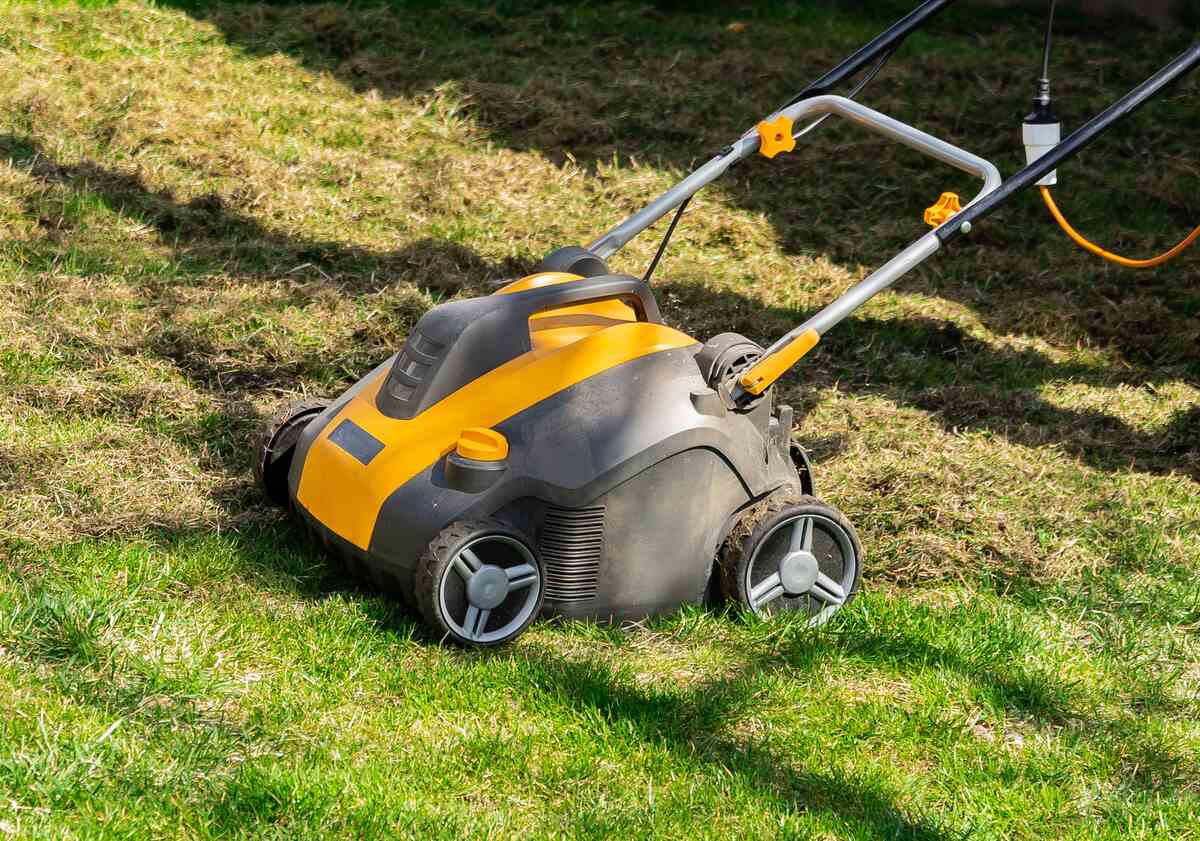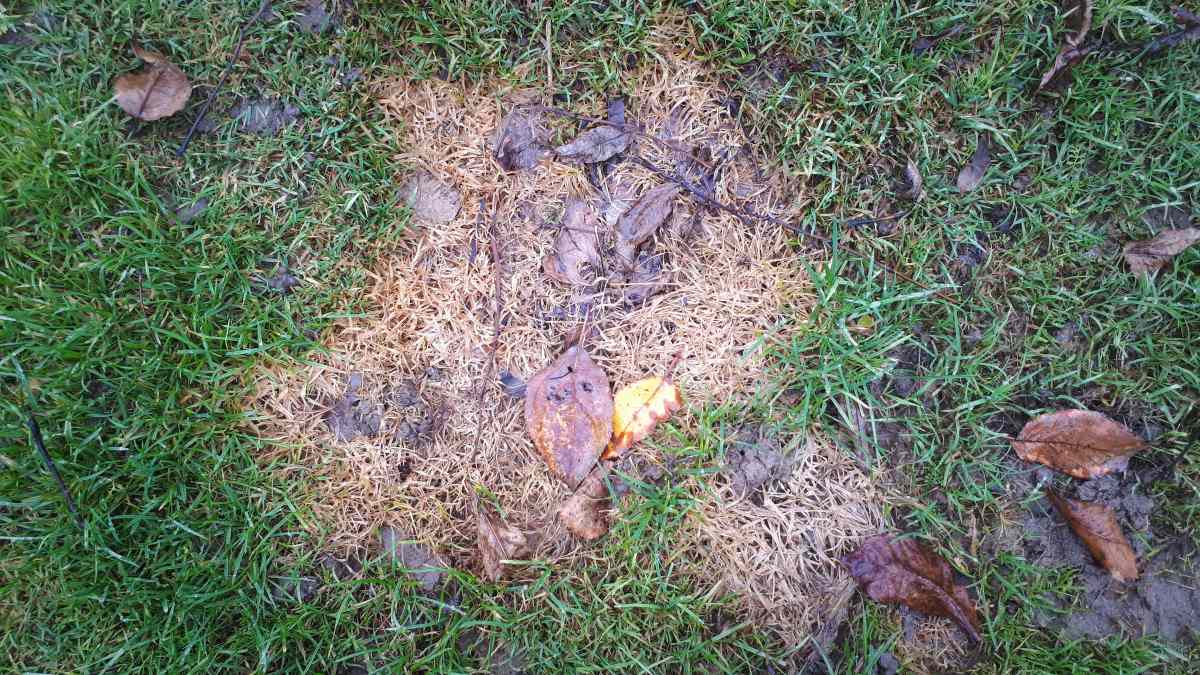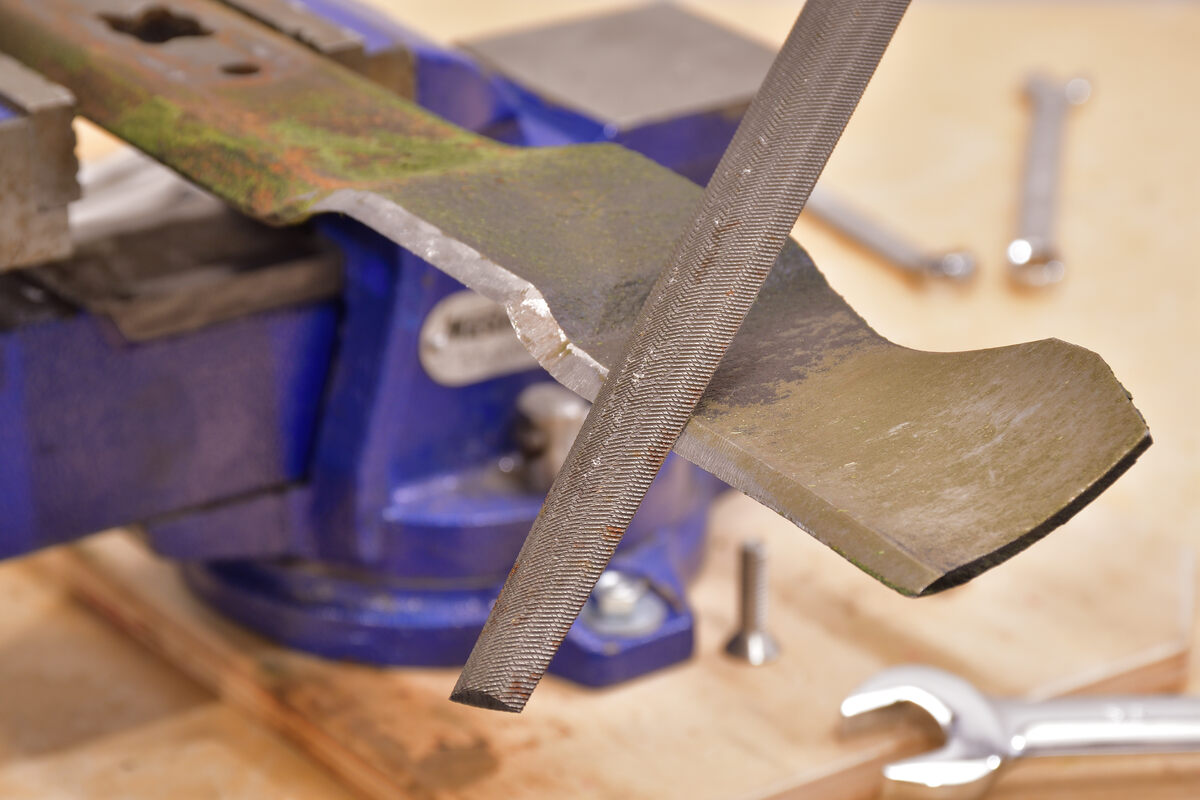
Generally, you should expect to sharpen lawn mower blades every 20 to 25 hours of use. However, factors like your grass type and thick thatch layers can dull them quicker, leading to torn or ragged grass and poor mower performance.
I’m in charge of all lawn mower maintenance (and mowing, for that matter), so I’ll talk about how often I sharpen my blades and offer some tips on making blade maintenance a little easier.
When to Sharpen Mower Blades
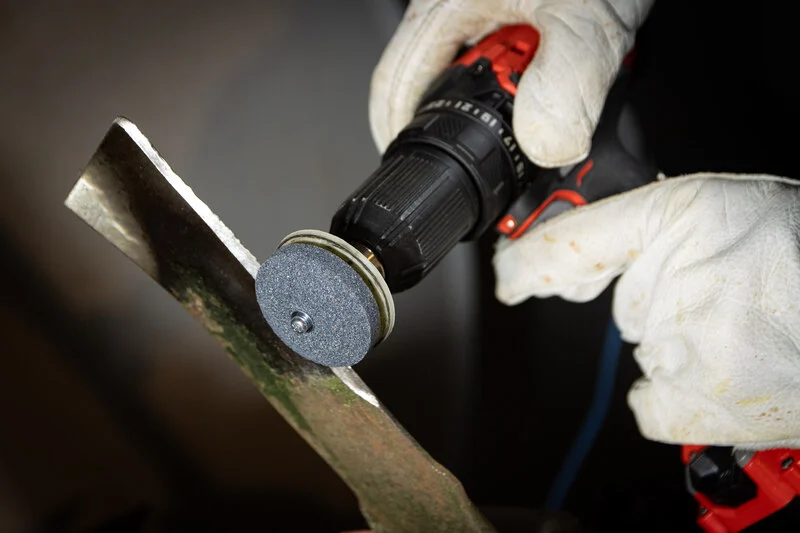
On average, expect to sharpen your mower blades every 20 to 25 hours of mowing. An easy way to figure out how often is to divide 20 or 25 hours by how long it takes you to mow. This calculation gives you an idea of how many times you can mow before sharpening.
| Mowing Time per Session | Frequency of Sharpening (Sessions) |
| 30 minutes | 40 to 50 |
| 1 hour | 20 to 25 |
| 1 hour 30 minutes | 14 to 17 |
| 2 hours | 10 to 13 |
| 2 hours 30 minutes | 8 to 10 |
| 3 hours | 7 to 8 |
As the table above shows, if you don’t have a huge lawn, you can go for quite a while before sharpening your lawn mower blades. For some homeowners, 40 to 50 mowing sessions could span two years. I recommend sharpening them at the beginning of each mowing season.
My Personal Experience: It takes about an hour each time I cut the grass, including moving the trampoline and emptying the grass catcher bag. Based on the table above, I should sharpen my blades every 20 to 25 sessions.
Mowing an average of 4-6 times a month puts me at sharpening blades every 4-6 months. As I typically cut grass from April to mid-October, I could theoretically sharpen my blades at the beginning of the season and stretch it until fall.
However, I’ve found that my cool-season lawn does better if I have sharp blades to start with and then again mid-summer. Remember, Kentucky bluegrass and perennial rye grow a lot early in the season and again late in the season, slowing down when it’s hot. Sharpening them mid-summer means my mower is ready for that late-season growth spurt.
My Tip: Have more than one set of blades for your mower! I have two sets of mulching blades for my mower — that way, I always have one on the mower and one ready to go — and I sharpen them in January or February when life is less chaotic.
That way, I can just switch the blades about the 4th of July, and I’m not waiting on blade sharpening during the height of the mowing season. Plus, if something happens to a set of blades while mowing, I don’t have to run to the hardware store for a replacement.
See Related: How to Mow a Lawn the Right Way
Signs Your Mower Blades Need Sharpening
Sometimes, your mower blades will dull faster than you expect. If you see signs of dull mower blades, even if you haven’t mowed more than 20 hours, you should sharpen them immediately.
Torn or Ragged Grass Tips
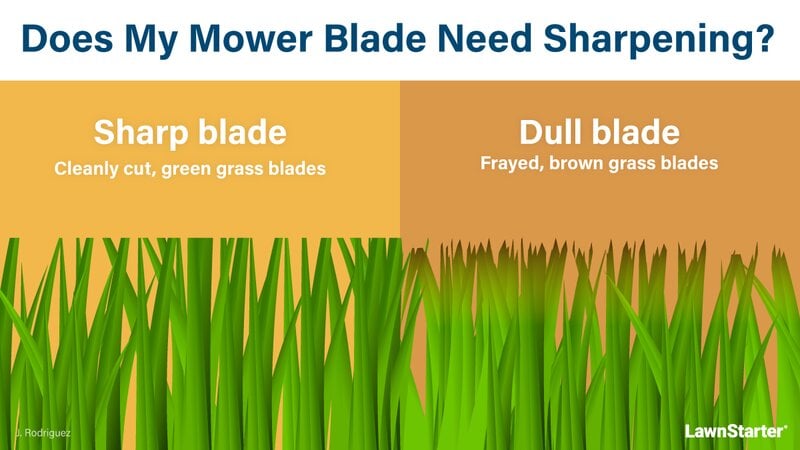
The best way to tell if your mower blades need sharpening is to look at your grass after mowing. Dull blades tear the grass instead of cutting it, which results in torn, ragged edges that may turn brown a day or two after mowing.
Uneven Grass
If your lawn mower leaves patches of grass that are uncut or cut at uneven heights, it could be a sign that your blades are dull and not cutting cleanly. As the blades spin, they may push the grass out of the way instead of cutting it.
Clumping Grass
If your mower leaves clumps of grass instead of scattering it uniformly across the mowing path, it’s a good idea to check the blades. Dull blades will have difficulty cutting through thick, dense grass, causing it to bunch up under the mower deck.
See Related: How to Prevent Grass Clumping When Mowing
Poor Mower Performance
Dull blades will also impact how your mower runs since they can’t cut grass efficiently.
- You may notice that your mower is running more slowly or struggling to cut the grass since dull blades force the mower to work harder, putting more strain on the engine.
- The engine may stall or bog down more often, especially when cutting through thick grass.
- If the blades are dull and negatively impact performance, your mower may also use more fuel than usual. Research published in the Agronomy Journal shows gasoline usage was 22% higher with dull blades.
- Likewise, if you have a push mower, you may have to work harder to push it than you would if your blades were sharp.
Unusual Vibrations or Noise
Lastly, a dull blade (or blades) may cause your mower to vibrate more than usual, which may affect its sound when running. Check the blade’s sharpness if you notice the mower shaking more or sounding off.
Factors that Affect Sharpening Frequency
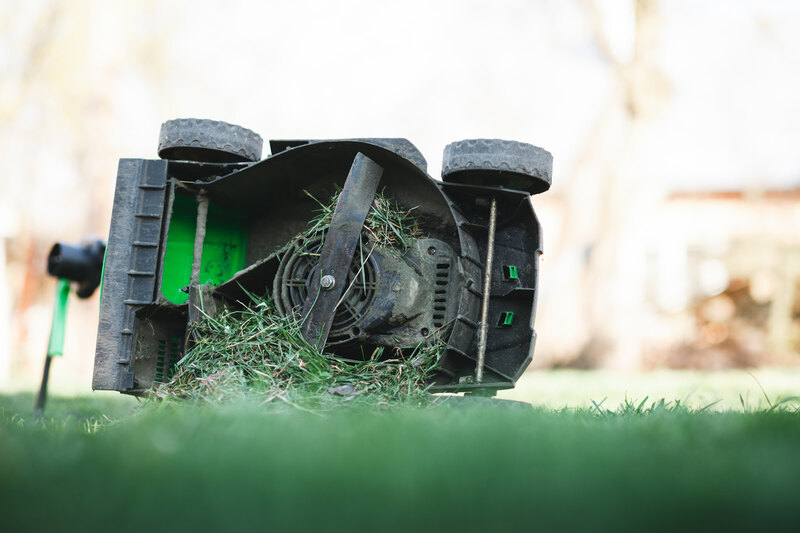
Lawn Size
The larger your lawn, the longer it takes to mow it, meaning more wear and tear each time. Thus, you’ll need to sharpen it more times throughout the season — or in a more rapid timeframe, if that makes sense.
You still want to aim for the sweet spot of 20 to 25 hours (unless they’re showing signs of dulling), but lawn mower maintenance happens more often when it takes two hours to mow rather than 30 minutes.
See Related:
Grass Type
The kind of grass growing in your yard also affects the frequency of sharpening. Some grass varieties, like Zoysia and St. Augustine, have thicker, coarse blades that require more effort to cut and wear down mower blades quicker. Cool-season grasses, like Kentucky bluegrass and fine fescue, have softer blades that cut easier and don’t dull as quickly.
Lawn Conditions
Debris in your grass will also dull blades faster. If you have a thick thatch layer, the dead grass will add extra wear and tear to your blades if the mower pulls it into the mowing deck. Yet another reason to dethatch regularly and try to prevent thatch accumulation in general.
Homeowners with sandy soil will also need to sharpen their blades more quickly, as the sand on the grass blades acts as an abrasive, wearing down the metal edge.
Wet grass also encourages rust and dulls mower blades, so avoid cutting the lawn until it’s fully dry.
My Tip: With a large field behind my house and desert (think sagebrush and wide open spaces, not sand and cacti) beyond that, my yard is almost always dusty. It helps my blades if I try to mow the afternoon or the day after I water the grass. Running the sprinklers helps to wash the dust off the grass — the key is making sure the lawn is dry before mowing.
See Related:
- What is Thatch in Your Lawn?
- How to Dethatch Your Lawn
- Reasons Why You Shouldn’t Mow Wet Grass
- Signs Your Lawn Needs Watering
Benefits of Sharp Mower Blades
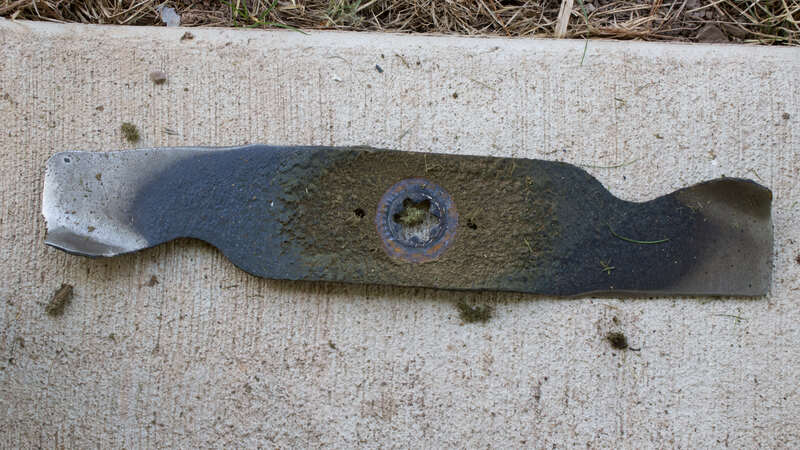
Regardless of the task at hand, you’ll see better results if the equipment you’re using is cared for and well-maintained. This applies to mowing, too, and sharpening lawn mower blades.
First and foremost, you’ll have healthier grass and a reduced risk of pest and disease problems, giving you a better-looking lawn. But you’ll also mow more efficiently, consuming less gas and extending the life of your mower.
See Related:
Tips for Mower Blade Maintenance
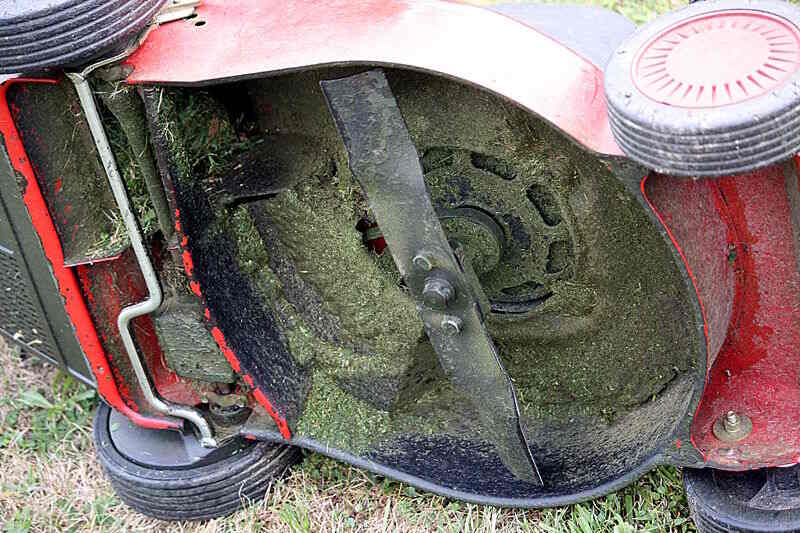
To keep your mower blades as sharp as you can for as long as possible, follow these tips:
- Avoid mowing over hard objects. Walk the yard before mowing and remove rocks, sticks, and outside toys.
- Try to mow only when the grass is dry.
- Keep the mower deck at the appropriate height for your grass type to avoid cutting the grass too short. It also helps keep you from hitting roots and the ground with your blades.
- Dethatch your lawn regularly.
- After mowing, clean the lawn mower deck and blades. Clippings hold moisture and can cause rust and dulling.
- Invest in high-quality blades that last longer.
- Store your mower in a dry, covered area to prevent rust on the blades.
When to Replace Mower Blades Instead of Sharpening
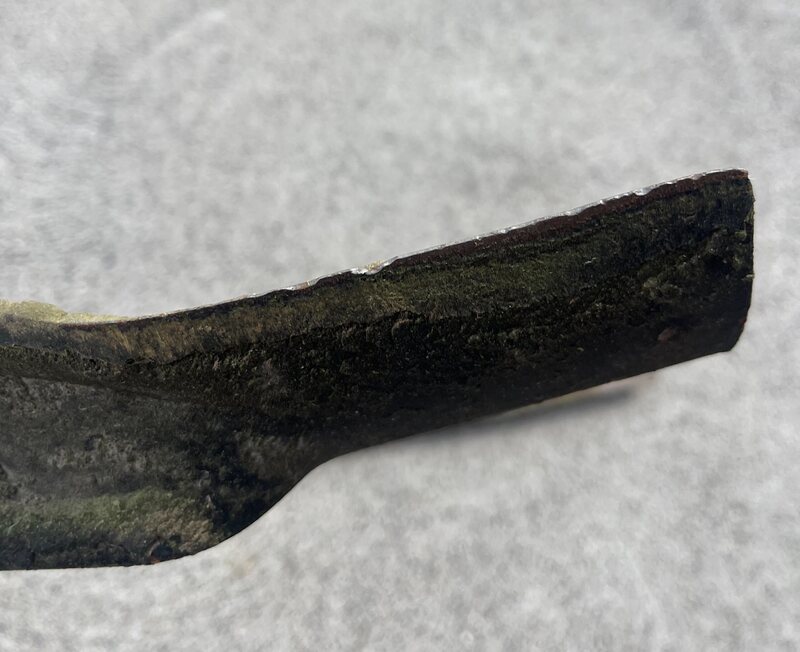
Each time you sharpen your mower blades, you remove some of the metal, causing them to become thinner and thinner. So, eventually, you will need to replace the blades instead of trying to sharpen them again. When depends on the quality of the blade. You should typically replace them after 5 to 10 sharpenings or if the blade becomes less than half an inch thick.
FAQ About Sharpening Mower Blades
It depends on how badly it’s bent. If the blade is bent slightly, it may be repairable. In that case, you can usually straighten it using a hammer. However, if the blade is severely bent, you’re better off replacing it to avoid damaging your mower or putting yourself in danger from a safety standpoint.
Yes, sharpening blades while they’re still on your mower is possible. However, doing so will be much trickier because of the limited access, and the results will be less satisfactory. It does work well in a pinch, though, especially if you’re doing a quick touch-up mid-season.
The cost for professional sharpening will vary depending on your area and the blade size, but you can expect to pay approximately $5 to $15 per blade. New blades typically run between $30 and $40, so you don’t want to pay much more than $15 or $20 for sharpening per blade, as it becomes cost-prohibitive.
You’ll need a socket wrench to remove the blades, a wire brush to clean dirt and debris off them, and your chosen tool for sharpening. You can use a bench grinder, file, sharpening stone, or angle grinder. A vise to hold the blades during sharpening and a blade balancer to ensure they’re balanced before putting them back on the mower are also helpful.
Note: Complete instructions on sharpening mower blades are available to help guide you through the process.
Is Lawn Mower Maintenance Getting to Be Too Much?
It can feel like a lot at times. Mowing and watering add enough to your to-do list, but when you factor in weeding, fertilizing, and mower maintenance, you can quickly run out of free time. Don’t worry, though, LawnStarter has you covered.
Contact us if you need help with lawn care tasks like aerating or dethatching or want to stop mowing entirely. We’ll connect you with a local lawn care pro who can free up your weekends and keep your yard looking beautiful.
Sources:
- Agronomy Journal: Mower Blade Sharpness Effects on Turf
- Briggs & Stratton: Top 5 Mower Troubleshooting Tips
- Greenworks: How to Sharpen Lawn Mower Blades
- University of Maryland Extension: Dull Mower Blade/Mower Injury – Lawns
Main Image Credit: Do Mi Nic / Adobe Stock
